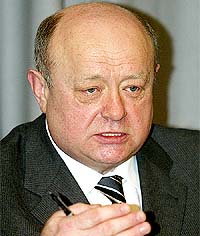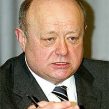
UKRAINE’S GEOPOLITICAL PREDICAMENT: WHILE LONGING FOR PLACE IN UNITED EUROPE IT CANNOT IGNORE RUSSIA’S CONCERNS
Publication: Eurasia Daily Monitor Volume: 3 Issue: 199
By:

This week’s events confirmed that Ukraine is being pulled in two directions as it faces a strategic dilemma. On the one hand, Kyiv is pushing for associated membership with the European Union and a free-trade deal with the rich bloc. On the other hand, the country’s heavy dependence on Russia for energy compels Kyiv to accommodate Moscow’s interests. Needless to say, the Kremlin looks askance at Ukraine’s European aspirations.
Today, October 27, Ukraine’s President Viktor Yushchenko is taking part in the annual Ukraine-EU summit in Helsinki, Finland, as the Finns currently hold the bloc’s rotating presidency. According to well-informed sources in the Ukrainian delegation, one of Kyiv’s main expectations from the summit is the beginning of negotiations on a new framework agreement on cooperation between Ukraine and the EU. Another key issue will be talks on the creation of a free-trade zone between Ukraine and the EU.
The Ukrainians hope that the new pact will include the prospect of eventual membership. For its part, Brussels remains noncommittal, reflecting what has come to be known as “enlargement fatigue.” Following its expansion to 10 new countries in 2004, the bloc is about to take in Romania and Bulgaria and is engaged in negotiations with Croatia and Turkey. So far, the EU has been reluctant to grant Ukraine a “membership prospectus” and instead included it in its “neighborhood policy” along with Belarus, the South Caucasus countries, Israel, and several Arab nations around the Mediterranean Sea.
Kyiv is deeply dissatisfied with what it perceives as Europe’s cold-shouldering and insists that it has the right to be treated differently than the other European “neighbors.” Prior to Yushchenko’s meetings with EU leaders in Helsinki, Ukraine’s envoy to Brussels was quite explicit about the EU’s perceived snubbing of Kyiv. “Ukraine accepts the European Neighborhood Policy but we do not welcome it,” said Roman Shpek, head of the Ukrainian mission at the EU, on October 25. “Our country is in Europe. We are not a neighbor to Europe,” he explained, adding, “For us, it is not pleasant to be in the same basket as Morocco, Libya, or Israel.” Integration with United Europe is a priority for Ukraine, asserted Shpek. He also remarked that Ukraine might in the future apply for an association agreement with the EU.
In Brussels, Ambassador Shpek was a guest of the EU-Ukraine Business Council (EUUBC) debate on the current state of economic relations between the two sides. During the meeting, the EUUBC unveiled a special report addressed to the parties of the Helsinki meeting. The blueprint calls on the EU and the Ukrainian government to focus their efforts on several key issues. The report suggests that the Ukrainians should concentrate on achieving better market access to the EU for its producers. Kyiv should also aim at improving legal certainty and property rights in Ukraine. The report stresses the need for the EU and Ukraine to jointly promote and implement energy efficiency projects. Most importantly, the report urges the Ukrainian government to speed up the negotiations on the accession to the World Trade Organization and commence negotiations on a free-trade agreement.
Commenting on the delayed WTO negotiations, Ukrainian officials confirm Kyiv’s commitment to finish the talks in January 2007 at the latest. But this likely is easier said than done — not least because of the Russian factor.
On October 24, speaking at a news conference in Kyiv after talks with his Ukrainian counterpart, Viktor Yanukovych, Russia’s Prime Minister Mikhail Fradkov said that Ukraine should respect Russia’s position on issues like cooperation with NATO, the EU, and the WTO. “I would say quite openly that we need to synchronize the negotiation process of our countries on WTO,” Fradkov said. He also raised concerns about the pro-Western ambitions of President Yushchenko.
Fradkov’s remarks came immediately after Ukraine cut a relatively beneficial deal on gas supplies for 2007 with Russia. Under the terms of the agreement, Ukraine will get at least 55 billion cubic meters of natural gas at no more than $130 per 1,000 cubic meters. Kyiv appears to have willingly agreed to a 36% increase in gas price, knowing full well that it is still a good bargain: the Yanukovych government had already figured the $130 price into Ukraine’s 2007 budget.
However, the gas deal seems to come with certain strings attached, as it will likely require Ukrainian concessions that would increase the Kremlin’s influence over its Slavic neighbor. Fradkov’s suggestion that the two countries have to synchronize their accession to the WTO is the case in point: such a move would slow or stall Ukraine’s entry and the start of a free-trade deal with the EU.
Moscow’s game is based on the two principal considerations. First, Russia fears that if Ukraine enters the WTO first, it could conceivably seek to influence the terms of Russia’s entry. Second, if Ukraine does get such leverage over Russia, the importance of Moscow’s energy leverage vis-à-vis Ukraine will likely diminish.
(UNIAN, Interfax-Ukraine, Vedomosti, Kommersant, RBK-Daily, October 25)




